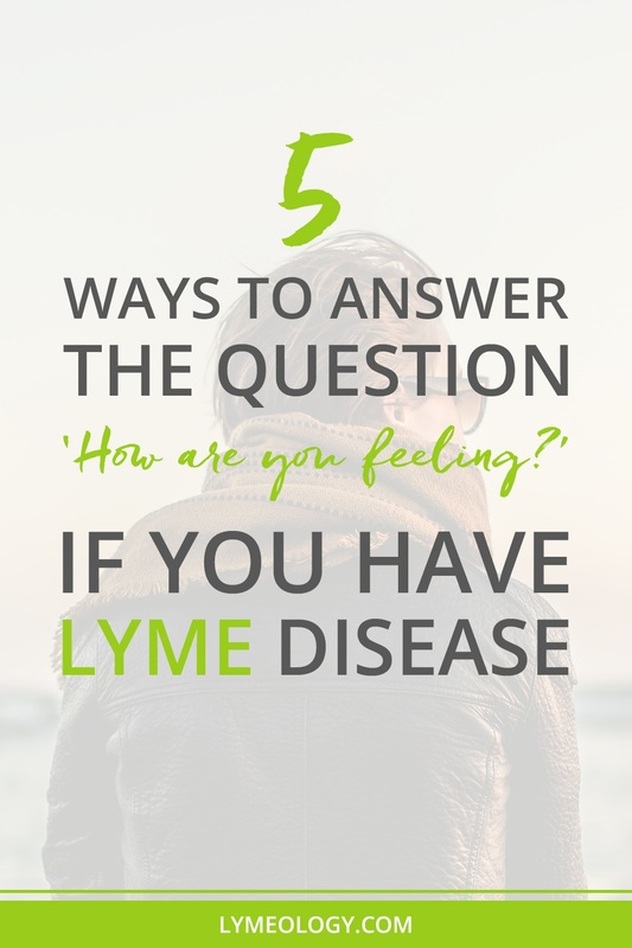|
This article was first published on Lymeology in 2016, a website that is no longer active. Most of the links on this post are informational, but a few are affiliate links to help maintain this website. "How are you feeling?," is a question people with Lyme disease are asked multiple times a day, every day. It's an innocent question, with a completely different meaning for those of us with invisible illness. Every time we are asked, we have to choose between lying and saying, "I'm fine," or being honest and saying something like, "Well, if you really want to know, I don’t remember the last time I didn't have heart palpitations, every muscle in my body hurts, and oddly enough, my medication makes my pee orange." Don't get me wrong. I'm beyond grateful to have people in my life who care enough about me to ask how I'm feeling, but I'm assuming they don't want every conversation between us to turn into a laundry list of my ever changing symptoms. Over time I've noticed that people struggle with what to say when responding to my bad news and the conversation comes to a screeching halt. I've learned there is a time and place to expand on the answer to this question, like a conversation over lunch with a caring co-worker or a phone call with a close friend. It's during those times when I feel like I'm truly being heard instead of simply creating an awkward moment I can't wiggle myself out of. Since most of us are in this for the long haul, here are some suggestions on how to respond to this daily question: 1. "I have my ups and downs." This is very true for those of us with Lyme disease or chronic illness. We may have a symptom-free day only to end up on the couch for the week. It is a constant roller coaster and I often describe it as such. Similar response: "I have my good days and bad days." 2. "I'm adjusting." Lyme disease creates a new normal. There are things we have to give up and there is grieving process that goes along with it. We have to come to terms with our diagnosis, while at the same time fighting with conventional medicine for appropriate treatment. For most of us it takes awhile to adjust. Similar response: "It’s a process." 3. "Not great, but I’m hanging in there." I save this one specifically for my bad days. It usually leads to a follow up question, and at that point I can let people know it’s a particularly bad day. It's important to tell people when they either need to leave you be or offer some extra help. I say this at work when I know I may not meet all my expectations for the day. Similar response: "It’s tough, but I'm making it." 4. "I'm putting one foot in front of the other." Many times all people with Lyme disease are able to do is get out of bed and get through the day (sometimes not even that much). Responding this way implies we are doing the best we can. Similar response: "I'm taking it one day at a time." And my personal favorite... 5. Say something positive about your current treatment. For example, "Well, I just switched antibiotics and I'm not having headaches anymore." Every day I try to think of one positive thing about my treatment—maybe I tried a new ginger tea that helps with nausea, or maybe I just finished a book that gave me a new understanding of Lyme. Dig deep and find something, anything, that is working. The truth is there isn't always something positive to say, so if that's the case choose one from the list above. Remember, most people won't understand what you are going through. When you really need to talk about how you are feeling make sure you reach out to your loved ones or your support network. Lyme disease is not something people can go through alone, no matter how you are feeling. "At the center of your being you have the answer; you know who you are and you know what you want." - Lao Tzu
0 Comments
Leave a Reply. |
WelcomeI'm Kerry (She/Her/Hers) and I am a licensed therapist, group facilitator, poet, writer, & speaker. This is a place to acknowledge and validate our suffering and trauma, while also learning how to turn toward aliveness and spaciousness. Categories
All
Archives
April 2024
|
|
Copyright © 2024 Kerry J Heckman All rights reserved. Disclaimer.
|
|


 RSS Feed
RSS Feed